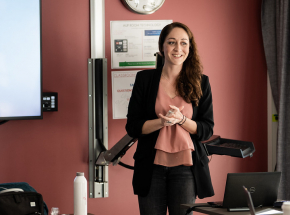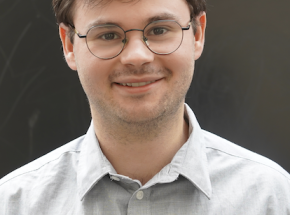- About AUP
- History of AUP
- Mission & Core Values
- Vision and Leadership
- AUP Recognition
- Alumni Success
- Campus Development
- Arts at AUP
- Policies & Guidelines
- Academics
- Undergraduate
- Graduate Programs
- MA in Diplomacy and International Law
- MA in Global Communications
- MSc in Human Rights and Data Science
- MA in International Affairs
- MA in International Affairs, Conflict Resolution, and Civil Society Development
- MSc in International Management
- MSc in Strategic Brand Management
- Find Your Thesis Advisor
- Previous Programs
- Cultural Program
- Faculty
- Summer School
- Research Centers
- The Center for Critical Democracy Studies
- The Center for Writers and Translators
- The George and Irina Schaeffer Center for the Study of Genocide, Human Rights and Conflict Prevention
- The Joy and Edward Frieman Environmental Science Center
- The Center for Media, Communication & Global Change
- Departments
- Academic Resources
- Academic Affairs
- Academic Calendar
- Academic Resource Center
- Library
- Registrar's Office
- Teaching and Learning Center
- Employer Network
- Accessibility & Accommodation Services
- Quai D'Orsay Learning Commons
- Paris as Classroom
- ACE Center
- Admissions
- Student Life
- Campus
- Get Involved
- Paris
- Support Services
- Student Development Help Desk
- Student Accounting Services
- Student Immigration Services
- Student Grievance Procedure
- Accessibility at AUP
- Diversity and Inclusion
- Health & Well-being
- Digital Student Handbook
- News
- Events
- AUP Giving
- Housing Offer for 2024-2025
- Housing | Spring 2024
- IRIS Project
- IT Services
- Alumni
- About AUP
- History of AUP
- Mission & Core Values
- Vision and Leadership
- AUP Recognition
- Alumni Success
- Campus Development
- Arts at AUP
- Policies & Guidelines
- Academics
- Undergraduate
- Graduate Programs
- MA in Diplomacy and International Law
- MA in Global Communications
- MSc in Human Rights and Data Science
- MA in International Affairs
- MA in International Affairs, Conflict Resolution, and Civil Society Development
- MSc in International Management
- MSc in Strategic Brand Management
- Find Your Thesis Advisor
- Previous Programs
- Cultural Program
- Faculty
- Summer School
- Research Centers
- The Center for Critical Democracy Studies
- The Center for Writers and Translators
- The George and Irina Schaeffer Center for the Study of Genocide, Human Rights and Conflict Prevention
- The Joy and Edward Frieman Environmental Science Center
- The Center for Media, Communication & Global Change
- Departments
- Academic Resources
- Academic Affairs
- Academic Calendar
- Academic Resource Center
- Library
- Registrar's Office
- Teaching and Learning Center
- Employer Network
- Accessibility & Accommodation Services
- Quai D'Orsay Learning Commons
- Paris as Classroom
- ACE Center
- Admissions
- Student Life
- Campus
- Get Involved
- Paris
- Support Services
- Health & Well-being
- Digital Student Handbook
- News
- Events
- AUP Giving
- Housing Offer for 2024-2025
- Housing | Spring 2024
- IRIS Project
- IT Services
- Alumni
Student
What led you to AUP and the Human Rights and Data Science program?
I finished my undergraduate at the University of Arizona. I originally studied computer science and then switched to information science and technology, where I focused on data science. I did my minor in Religious Studies and because of that, I ended up taking a ton of ethics classes. That got me thinking about technology – and about where we are going with technology, and the ethics behind the technology we're using. So, I was searching for an ethical data master's program, and that's when I found the Human Rights and Data Science program at AUP.
The transition of going right from undergrad to a grad program was kind of nice – because I was still in that student mentality and able to jump right in at AUP. It was wonderful. It was also really different than my undergrad experience, especially size-wise. My undergrad university has way more students. At AUP, it was a much smaller classroom setting. I was able to engage a lot more with my peers and my professors and have a bit more dynamic discussion. I loved my undergraduate experience, but I think I kind of missed that sometimes.
What have been some of the highlights of your time at AUP?
The relationships I’ve been able to have with my two professors – Professor Roda and Professor Perry – have been a highlight. Also, because the program is new, there was a lot of emphasis on the student experience. I’ve loved meeting such diverse people within the university. Within my program specifically, we had students from all over with different backgrounds. Some of us, like me, were a bit more computer science heavy – a lot of other people were into policy and government. To be in the same classroom with so many different perspectives was amazing.
You recently completed an internship with the OECD (Organization for Economic Co-operation and Development) …
I was working in the communications department with the impact team, working with user data. It was such a great experience from a data analytics perspective – being able to work with such huge amounts of global and diverse data. I really benefited from the real-life experience. I went right from undergrad to grad, so it was nice to get real experience working with data. Plus seeing what the OECD does as far as human rights and humanitarian efforts solidified my goals of working within either an NGO or an international organization in the future.
What's next for you?
Right now, I’m doing a lot of thesis work. I’m diving into data privacy within international organizations. A lot of the rules, regulations and guidelines that the EU has to follow, international organizations don’t have to follow. I’m looking into what those differences are, and the strengths and weaknesses of different approaches.
After I finish my thesis, I’m doing a two-month solo trip to Asia to celebrate and take a little breather after so much work. I’ve also been working part-time throughout my studies to save money, so it’s been a lot of work.
When I come back, I’ll fully launch my job search. I’m also planning on getting an IAPP data privacy certification. I’m looking for data analytics positions within the private sector and international organizations. I’m hoping to get a job with an international organization or NGO. If that's not the first job, then hopefully second or third.
I am really excited. I have this ethical and humanitarian background when it comes to data science, which I think gives me a bit more of an edge in any data analytics role, especially one that’s dealing with user data or personal data.
Related
-

Rebecca Stone
Student
Read MoreRebecca Stone
Student
Reflections from a current HRDS student.
-

Alumni-Led Workshops
Featured Course
Read MoreAlumni-Led Workshops
Featured Course
Guest speakers, often AUP alumni, are regular fixtures in the MSc in Human Rights and Data Science.
-

Dominic Spada
Student
Read MoreDominic Spada
Student
Reflections from a current HRDS student.
